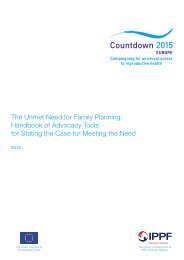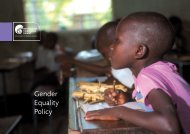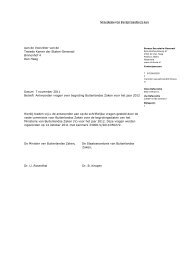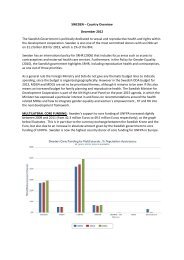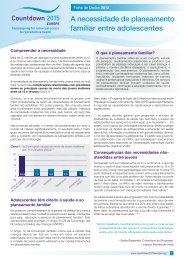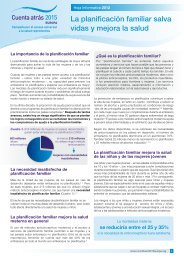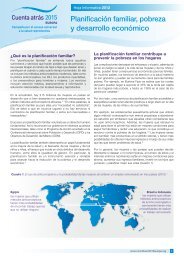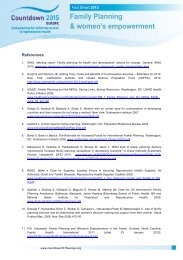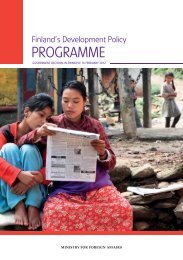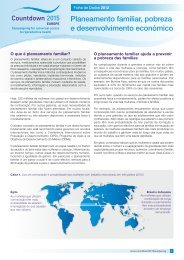2007 Health Policy - Countdown 2015 Europe
2007 Health Policy - Countdown 2015 Europe
2007 Health Policy - Countdown 2015 Europe
- No tags were found...
You also want an ePaper? Increase the reach of your titles
YUMPU automatically turns print PDFs into web optimized ePapers that Google loves.
<strong>Health</strong> <strong>Policy</strong>Improving <strong>Health</strong> to Reduce PovertyForewordwww.irishaid.gov.ie
<strong>Health</strong> <strong>Policy</strong>Improving <strong>Health</strong> to Reduce PovertyExecutive Summarywww.irishaid.gov.ie
Family with a primary healthcareworker in Iringa, Tanzania
Children wait for vaccination inKenya’s North Eastern Province
<strong>Health</strong> <strong>Policy</strong>Improving <strong>Health</strong> to Reduce Poverty2. <strong>Health</strong> <strong>Policy</strong>2.1. Vision of <strong>Health</strong>DevelopmentIrish Aid has a vision for health development withthe following characteristics:• That the improvement of health outcomes is acentral development objective• That people are empowered to takeresponsibility for improving their health status• That the contribution to health development byall relevant stakeholders is recognised• That investments are made to facilitate thedevelopment of robust national health systems2.2. Guiding principlesThe guiding principles of the White Paper will beapplied to Irish Aid’s support for health.BOX 2: Guiding PrinciplesPartnership“Ireland’s relationship with the developing world will bebased on a spirit of partnership and equality.”- White Paper on Irish AidWe will provide assistance for healthin the context of locally owned and ledprogrammes. We will align our supportwith locally owned priorities, programmesand systems, and harmonise requirementsand procedures for disbursing andmanaging aid with other donors.Public Ownershipand TransparencyWe will ensure greater awareness and ownership ofthe programme.We will strengthen linkages with Irishinstitutions and organisations. Wewill ensure that the place of health indevelopment is reflected in Irish Aid’sstrategy to increase awareness ofdevelopment issues. We will consult withpartners on major health policy initiatives.Effectiveness andQuality AssuranceWe will use pubic resources efficiently and effectively,providing value for money for the Irish taxpayer.We will adopt approaches and standardsbased on internationally-accepted bestpractice. We will work in close coordinationwith other donors and the internationalcommunity in order that developmentassistance for health is used to besteffect at country and global levels. Wewill systematically monitor and evaluateimplementation of the health policy.CoherenceWe will work for a coherent approach todevelopment across all Government Departments.We will aim for coherence between thehealth policy and other development policiesin Irish Aid; and with relevant policies ofthe Department of <strong>Health</strong> and Children andother Government Departments.Long-Term SustainabilityOur interventions will be durable and will bring benefitsover the long term.We will take a long term view, tacklingdeterminants of poor health and strengtheninginstitutional capacity so poor countriescan meet their own health needs. We willpromote the empowerment of peopleto participate in decisions affecting theirhealth. We will integrate concerns ongender, environment, HIV/AIDS andgovernance into our programmes.18 www.irishaid.gov.ie
2.3. <strong>Policy</strong> GoalTo improve the health of the world’s poor people asan integral aspect of sustainable development andachievement of the Millennium Development Goalsvulnerability to ill-health and enable them tochoose a healthier lifestyle and participate in theirhealth care at the household and communitylevel.<strong>Health</strong> <strong>Policy</strong>Improving <strong>Health</strong> to Reduce Poverty2.4. <strong>Policy</strong> ObjectivesIrish Aid has adopted a number of specificobjectives to achieve this goal, working through itsvarious partnerships and programmes.1. Address the determinants of ill-health2. Strengthen health systems to serve the poormore effectively3. Promote health strategies that meet the needsof the poor and marginalised4. Contribute to an effective internationalresponse to health needs of the poor5. Ensure a coherent approach to healthimprovement and health protection in all IrishAid’s workObjective 1:Address the determinants of ill-healthIrish Aid will:• Address the political, social, cultural, economicand environmental factors affecting the health ofpoor people.• Adopt a multi-sectoral approach and supportpolicies and investments in ‘non-health’ sectorsthat disproportionately affect the health of poorpeople such as education, nutrition, water andsanitation, gender inequality and theenvironment.• Support a holistic approach and measures thataddress all the MDGs together and not just thosewith specific health targets.• Give priority to the cross-cutting issues ofHIV/AIDS, gender inequality, environmentand governance.• Support community empowerment andparticipation approaches that reduce people’sObjective 2:Strengthen health systems to servethe poor more effectivelyIrish Aid will:• Provide support through aid modalities thatstrengthen pro-poor health systems.• Support ongoing reform processes to strengthenhealth systems, including SWAps, decentralisationand civil service reform programmes.• Strengthen institutional capacities needed foreffective health systems, emphasising humanresources for health, information systems andprocesses for planning, review and budgeting.• Support interventions at country level that willproduce, retain and sustain adequate humanresources for health.• Promote appropriate action at international leveland in Ireland to reduce the brain drain of healthand medical personnel from sub-Saharan Africa,and to monitor the effects of such brain drainfrom other low and middle-income countries.• Promote harmonised donor support to thehealth sector at country level.• Promote participation of all relevant stakeholdersin financing and delivery of health care, includingcivil society organisations and the private sector.• Promote integration into national healthsystems of targeted global initiatives againstmajor diseases, such as HIV/AIDS.• Support equitable and fair health financingmechanisms that protect the most vulnerable. 1111 This means that each person receives health care servicesaccording to their needs whilst contributing according totheir meanswww.irishaid.gov.ie19
Objective 5:<strong>Health</strong> <strong>Policy</strong>Improving <strong>Health</strong> to Reduce PovertyEnsure a coherent approach tohealth improvement in all Irish Aid’sworkIrish Aid will:• Seek to achieve internal coherence across allIrish Aid sections and country programmes.• Strengthen integration within Irish Aid ofsupport for health with other sectors that havean impact on health outcomes.• Maintain coherence with other Irish Aid policiesand ensure appropriate response in healthprogrammes to the cross-cutting issues of HIV/AIDS, gender, environment and governance.• Strengthen linkages in Irish Aid betweensupport at international, regional and countrylevels, including greater participation by staffacross different levels.• Seek appropriate balance and consistencybetween international support for multi-lateralorganisations and global health initiativesand support for development of sector wideapproaches at country level.• Coordinate with Department of <strong>Health</strong>and Children on issues of global health anddevelopment.• Strengthen linkages with Irish institutionsand organisations working in global health topromote alignment of policies and strategieswith internationally accepted best practice.www.irishaid.gov.ie21
<strong>Health</strong> <strong>Policy</strong>Improving <strong>Health</strong> to Reduce Poverty3. <strong>Health</strong> StrategyThis section sets out how Irish Aid will implementthe policy through partnerships at national,regional and international level. The mainpartners are national governments, multi-lateralorganisations, global health partnerships andcivil society organisations. Through linkingsupport to different partners and using differentmodalities Irish Aid will seek to create synergiesand maximise effectiveness of its aid for health.The proportion of Irish Aid’s expenditure forhealth will be maintained at about its current level(20%), reflecting the importance attached to healthimprovement for alleviating poverty and achievingthe Millennium Development Goals.3.1. Bilateral AssistanceIrish Aid will support health as a priority throughits bilateral programmes, mainly in sub-SaharanAfrica. The general approach will be to continueto move away from support for individual projectsand towards a more programme-based approach.Assistance to each country will be provided througha mix of different aid approaches and modalities,including Sector Wide Approaches (SWAp), Area-Based Programmes, General Budget Support andsupport for civil society and the private sector.Irish Aid will adopt a multi-sectoral approach tohealth within the overall framework of the CountryStrategy Paper. Support will be coordinated withother donors and aligned to national PRSPsand health sector strategies, reflecting Ireland’scommitment to harmonisation and the 2005 ParisDeclaration on Aid Effectiveness. Support will befocused on building national capacity towardssustainable health systems. HIV/AIDS, gender,environment and governance will be addressed aspriorities in Irish Aid’s health programmes.The main modality of support for health will beto provide funding to the sector in the contextof a SWAp. Irish Aid will also support healththrough general budget support with the potentialadvantages of improving harmonisation, reducingtransaction costs and increasing predictabilityof funding for health. These programmaticapproaches at national level will be complementedby continued support at sub-national level, inthe context of area based programmes and localdevelopment. Here Irish Aid will focus on buildingcapacity of health systems at provincial and districtlevels and help strengthen links between nationalpolicy dialogue and local delivery of health services.Support through the traditional project approachwill be reduced, recognising the high transactioncosts and the limited contribution of projects tobuilding sustainable health systems. Situationswhere Irish Aid may consider it appropriate tocontinue such an approach include pilot initiatives,capacity strengthening, research and supportfor civil society partners. In these instances IrishAid will ensure that support through projects iscoherent with overall sector support.3.1.1. <strong>Policy</strong> DialogueBy increasing the channelling of funds throughSWAPs and general budget support, Irish Aidwill broaden the scope of its policy dialogue withgovernment and other partners. Irish Aid willraise health issues in dialogue both within thehealth sector and in the wider development andmacroeconomic context.Strategic focus:• Promote integration of health in PRSPs andnational development plans, including theuse of health and health service indicators inmonitoring implementation.• Promote development of PRSPs that are needsbasedand aligned with the MDGs.• Encourage and monitor governments’commitments to allocating appropriate levels ofdomestic resources for health, in line with theAbuja Declaration. 14• Promote equitable health financing mechanisms,and support abolition of user charges for basic14 In the Abuja Declaration, African governments committedto allocating 15% of domestic resources to health22 www.irishaid.gov.ie
services where they are a barrier to access bythose who cannot afford to pay.• Promote greater involvement of all stakeholdersin health and health-related sectors, includingthe private sector and civil society organisations,including organisations which represent thosenormally marginalised from policy processes.• Emphasise the need for a multi-sectoral approachto health, addressing determinants of healthincluding food security, population, environment,education and water and sanitation.• Support strengthening of government capacityto develop and manage expenditure frameworksthat are aligned to national and sector plansand targets.3.1.2. Sector Wide ApproachesThe Sector Wide Approach (SWAp) is nowregarded as good development practice in lowincomecountries by governments and donors.SWAps can reinforce national leadership,transparent processes and institutional capacitybuilding. Irish Aid fully supports the SWApsconcept for the development of sustainable nationalhealth systems to meet people’s essential healthneeds. It will continue to be its main approachto support the health sector in the medium term.Irish Aid also acknowledges that the pace of SWApevolution needs to be matched with the countryspecific circumstances.Strategic focus:• Maintain a strong outcome focus, seeking toensure that SWAp processes lead to improvedhealth care delivery and health outcomes.• Align Irish Aid programmes with nationalsector strategies and processes.• Determine the focus of Irish Aid’s engagementin SWAps in each country context, as a basis forpolicy dialogue and capacity building.• Contribute to pooled funds arrangements foran agreed expenditure programme when localsystems for management and delivery are of anacceptable standard.• Work with donors to simplify and harmonisesystems so as to reduce the burden on partnergovernments.• Undertake country missions and analyticalwork in cooperation with other donors andavoid duplication of work.• Identify new mechanisms for funding andsupporting private sector and civil societyorganisations active in pro-poor service deliveryand advocacy work.• Promote the development and implementationof health sector and inter-sectoral strategies toaddress gender, HIV/AIDS and environment.• Emphasise links of the health sector withbroader national development processes andmacro-economic policy environment.3.1.3. Support through LocalDevelopmentSince the 1990s Ireland has supported building ofhealth services through Area Based Programmes,implemented in partnership with local government.Tangible benefits include improved healthinfrastructure and training of health professionals.Area Based Programmes have informed policydialogue through understanding of the healthsituation and health care needs at district andcommunity level. As Irish Aid engages more ata national level in SWAps, selective support atsub-national level will continue using appropriatemodalities. These will include traditional area basedprogrammes, regional sector and general budgetsupport and support for civil society organisations.Strategic focus:• Coordinate sub-national support with nationallevel engagement in SWAps and donorharmonisation.• Promote effective engagement of allstakeholders, including participation by civilsociety and local communities, in the contextof sub-national structures of governance andhealth sector management.• Promote links between national and subnationallevels, to ensure that improved sector<strong>Health</strong> <strong>Policy</strong>Improving <strong>Health</strong> to Reduce Povertywww.irishaid.gov.ie23
<strong>Health</strong> <strong>Policy</strong>Improving <strong>Health</strong> to Reduce Povertyprocesses lead to improved health care deliveryand better health at local level.• Support district level pilot initiatives that arelinked to national level policy.• Utilise information from practice and researchat sub-national level to inform policy dialogue,strategies for scaling up services and allocationof national resources.• Evolve approach at sub-national level accordingto development of decentralisation processesand health sector reforms.• Promote participatory and community basedapproaches whereby a community definesits own health needs, works out how theseneeds can best be met and collectively decideson a course of action to achieve the desiredoutcomes.3.2. Regional PartnershipsIrish Aid has had a limited involvement inregional programmes for health, mainly focusedon malaria and HIV/AIDS in East and SouthernAfrica. Regional programmes and networks canadd value in a number of ways. They can promotesynergy in addressing common health problemsthrough sharing of ideas and experience and thedevelopment of common approaches. They canhelp bridge the gap between global organisationsand the country level, and provide morecoordinated and coherent national responses tothe various global health initiatives.Strategic focus:• Examine scope for greater engagement withregional and sub-regional organisationsand programmes to strengthen effectivenessof country health programmes, includingNEPAD 15 , WHO Regional Office for Africa(AFRO), and regional INGOs.15 New Partnership for Africa’s Development (NEPAD)is a development initiative of African leaders involvinga constructive partnership between Africa and thedeveloped world, arising from OAU Summit in 1999.• Review the impact and added value ofsupporting regional projects in malaria andHIV/AIDS.• Identify health challenges that can be addressedmore effectively through regional approachesand explore opportunities for Irish Aid support.• Seek to learn from regional initiatives and applylessons in country programmes.3.3. Global Partnerships3.3.1. Working with UNorganisationsIreland makes voluntary contributions to a numberof UN development and relief agencies, funds andprogrammes, which come on top of its mandatorycontributions to UN agencies. The main ones withtechnical and coordinating roles in health areWHO, UNICEF, UNFPA and UNAIDS. Irish Aidestablishes its level of support through internalconsultation and based on established criteria(see box). Irish Aid engages in policy dialoguethrough their governance structures and formalbilateral consultations.BOX 3: Criteria for Irish Aidsupport to UN agencies:1. Poverty reduction focus2. Relevance to MDGs3. Management strength4. Commitment to reform5. Commitment to coordinate withother multilateral and bilateralagencies especially as part of pooledfunding arrangements in partnercountries and in support of countrycoordination under UNAIDS6. Transparency of reportingarrangements24 www.irishaid.gov.ie
Among the UN agencies in health, Irish Aid’s mostin-depth engagement is with WHO, as the leadingtechnical agency. Support is provided according toa multi-annual strategic programme of cooperation.Engagement with WHO is coordinated with theDepartment of <strong>Health</strong> and Children. Irish Aidfocuses on a number of key areas of organisationalperformance with the following objectives:1. Support the reform process in WHO2. Work towards a more harmonised andcoherent multi-annual engagement3. Encourage and assist WHO’s Country FocusInitiative 164. Make a direct contribution to MDGrelated areas of work and health systemsdevelopment5. Provide for an emergency responseStrategic focus:• Provide core funding to UN agencies involvedin health, at a level consistent with Irish Aid’spolicy priority to health.• Work closely with other like-minded donorsto strengthen collaborative cooperation withWHO, including moving to a joint annualconsultation process.• Engage in policy dialogue with WHO,UNFPA, UNICEF and UNAIDS through theirgovernance structures and formal bilateralconsultations.• Promote greater coordination andharmonisation between UN agencies andwith other development partners in health atinternational, regional and country levels.• Promote greater alignment by UN agencies oftheir support with SWAps.• Work in country with UN agencies tostrengthen their capacity and to more effectivelyfulfil their mandated functions in the sector.3.3.2. Working within the<strong>Europe</strong>an UnionThe <strong>Europe</strong>an Union is one of the largest donorsin health. The bulk of assistance to developingcountries is provided through the <strong>Europe</strong>anDevelopment Fund which Ireland supports as aparty to the Cotonou Agreement. As a developmentplayer the <strong>Europe</strong>an Commission (EC) plays acomplementary role to Member States. At countrylevel assistance in health is focused on health sectorand general budget support. The EC also providesmacro-economic support that is linked to improvedhealth outcomes and support to health-relatedsectors. The Directorate General for Development(DG Development) seeks to promote a coherent EUresponse in its support for health, for example withthe <strong>Europe</strong>an Programme for Action to ConfrontHIV/AIDS, Malaria and Tuberculosis throughExternal Action (2005).Strategic focus:• Contribute to EU health policy dialoguethrough participation in the <strong>Health</strong>, AIDS andPopulation <strong>Health</strong> experts group of the DGDevelopment.• Promote health priorities in development atlevel of the Council.• Promote best-practice approach to support forhealth by all Member States.• Support the EU to take on a strongerleadership role in relation to coordination andharmonisation of procedures and policies inhealth. 17• Support the role of EU in countries andsituations where it brings added value, such asfragile states where few donors are present.<strong>Health</strong> <strong>Policy</strong>Improving <strong>Health</strong> to Reduce Poverty16 The Country Focus Initiative aims to improve WHO’scontribution to people’s health and development withincountries.17 A leadership role by the EU in coordination andharmonisation was envisaged under the MonterreyInternational Conference on Financing for DevelopmentCommitmentswww.irishaid.gov.ie25
<strong>Health</strong> <strong>Policy</strong>Improving <strong>Health</strong> to Reduce Poverty3.3.3. Global <strong>Health</strong> Initiativesand PartnershipsThere has been a rapid proliferation of global healthpartnerships (GHPs) and funds in health (includingHIV/AIDS) and they have become a powerful forcein health development and poverty reduction. Theseinternational public-private partnerships developedout of a background of declining ODA, deterioratinghealth services and the growing challenge of majordiseases, especially HIV/AIDS, TB and malaria.Today they are playing a significant role bothin expanding access to existing interventionsand services and in supporting research anddevelopment of new drugs and vaccines. They haveyet to become well coordinated at internationallevel and being mainly single-focus initiatives donot foster an integrated approach to addressingthe MDGs. Furthermore their top-down, verticalapproach imposes high transaction costs and makesit difficult to harmonise global initiatives withcountry led programmes.BOX 4: Global health partnershipsand initiatives funded by Irish Aidin 2006:• Global Fund to Fight AIDS, TB and Malaria• GAVI Alliance• Global Polio Eradication Initiative• <strong>Europe</strong>an Malaria Vaccine Initiative• Global Alliance for TB Drug Development• International Partnership for Microbicides• International Aids Vaccine Initiative• Clinton Foundation HIV/AIDS Initiative 18• Medicines for Malaria Venture• Global <strong>Health</strong> Workforce AllianceStrategic focus:• Irish Aid will broaden and deepen itsengagement with GHPs. This will be articulatedin a 5-year strategy for support to globalpartnerships in health and HIV.• The focus of support will be guided by a set ofprinciples developed in 2005. 19BOX 5: Principles to guide IrishAid support to global healthpartnerships:1. Target support to those GHPs that focuson HIV/AIDS and other major diseasesof poverty that are key to achievingthe MDGs, and which demonstrateclear advantages over – and potentialcomplementarities with – existing aidmechanisms.2. Provide support to GHPs on conditionof their demonstrating implementationof best-practice approaches, goodgovernance (at global and country levels),transparency and accountability for theiractions.3. Only support GHPs that help to strengthenrecipient country governments in theirstewardship and democratic accountabilityroles.4. Facilitate the representation, participationand interests of the important relevantstakeholders, including government andcivil society representatives, in global andcountry level partnerships.5. Ensure balance and coherence in themagnitude, content and fit of IrishAid’s support to GHPs and countrylevel development assistance, whichincludes budget support, povertyreduction strategies, SWAps and bilateralprogrammes.6. GHPs selected for support demonstratecommitment and adherence to principlesof harmonisation and alignment withexisting country systems. Country activities18 Under an agreement with the Clinton Foundation, theIrish government provides additional funding for HIV/AIDS to the health sector in Mozambique and Lesotho19 From ‘Engagement with and Support to Global <strong>Health</strong>Partnerships: A Review for Irish Aid’, Dr. Ruairi Brugha,May 200526 www.irishaid.gov.ie
should be financed through the SWApor government budget, where theseare effective, or through other agreedcoordination mechanisms.7. GHPs work through and aim to strengthenexisting country partnerships, andstrive to minimise transaction costs ongovernments and their developmentpartners.8. Ensure country lessons on GHPs arechannelled into global level policy andstrategy formulation, through effectivecommunication between Irish Aid’scountry offices and HQ; and HQ ensurethat country offices are well briefed onmajor GHP developments.9. Only initiate support to new GHPs, whereIrish Aid has the capacity to monitor,engage and ensure accountability andvalue for money, or where these functionsare undertaken within a wider donorcoordinated approach, in line with IrishAid’s policies.10. Coordinate monitoring of GHPs supportedby Irish Aid with like-minded donors, atthe global and country levels, in orderto maintain coherence between donorpolicies and to strengthen such donorinfluence at the international and nationallevels.11. Through support to GHPs strengthencountry public sector capacity and humanresources (HR), at all levels. Seek to haveprinciples of good HR practice adheredto, at all levels – including throughworking with the Department of <strong>Health</strong>and Children – so as to discourage thepoaching of scarce developing countryhealth workers.12. Support GHPs for medium to long termduration [6 yrs.], subject to ongoingmonitoring to ensure adherence to agreedprinciples and evidence of good practice.13. Work with countries, other donors andglobal policy makers to develop codesof good practice for GHPs, especially atthe country level, which are consistentwith and help to operationalise theseprinciples.3.4. Civil SocietyPartnershipsIrish Aid recognises the important role ofcivil society in improving the health of poorpeople in developing countries. The biggestcontribution has been in services delivery wherecivil society organisations (CSOs) often havecomparative advantage over the government inreaching geographically remote communitiesand marginalised groups. As one example, 57%of all sexual and reproductive health services indeveloping countries are provided by CSOs andthey have also assumed an increasingly importantrole in prevention, treatment and care and supportfor HIV/AIDS. Community based CSOs can bepowerful agents for change in reducing healthvulnerability through alterations in health-seekingbehaviour and adopting healthy lifestyles.Strategic focus:• Continue to support a broad range of civilsociety organisations working in healthincluding Irish NGOs and Missionary Groups,International NGOs and nationally basedNGOs in third countries.• Seek to strengthen coherence of the differentmechanisms of Irish Aid's support to civilsociety in health, at country level and throughcentral funding mechanisms.• Engage in policy dialogue with Irish INGOs andpromote the development of health policies andstrategies based on international best practice.• Promote the integration of civil society withinnational health systems including participationin SWAps and policy dialogue mechanisms,and development of formal agreements andcontracting mechanisms with Ministries of <strong>Health</strong>.• Promote the role of CSOs in governance andadvocacy for health.• Strengthen the capacity of CSOs throughsupporting organisational developmentprocesses and alliance building.<strong>Health</strong> <strong>Policy</strong>Improving <strong>Health</strong> to Reduce Povertywww.irishaid.gov.ie27
Child receiving measles inoculationin Somali region of Ethiopia
<strong>Health</strong> <strong>Policy</strong>Improving <strong>Health</strong> to Reduce Poverty4. Thematic Issues4.1. HIV/AIDSIn tackling HIV/AIDS, there has been a shift infocus towards the health sector, particularly ontreatment, since the launch of the 3x5 Initiative byWHO in 2003. 20 This followed the advent of antiretroviraltreatment for HIV/AIDS, opportunities tomake cheaper generic drugs available in developingcountries under the TRIPs agreement, and thelarge increase in funds available through globalinitiatives. The need for a more holistic approachwas recognised at the UN High Level Meeting onAIDS in 2006 and in the setting of a new globaltarget of ‘universal access to HIV prevention,treatment, care and support’ by 2010.Irish Aid’s response to HIV/AIDS is based on strongpolitical commitment to addressing HIV/AIDS asessential to development and achieving the MDGs.The principle strategy is the mainstreaming ofHIV/AIDS in all programmes. The approach inthe health sector is guided by the overall Irish AidHIV/AIDS policy, and Irish Aid Guidelines onStrengthening Access to Treatment for HIV/AIDSin Low Income Countries.Strategic focus:• Update existing Irish Aid policy onstrengthening access to treatment and developa broader strategy for support to the healthsector response to HIV/AIDS, encompassingprevention, treatment, and care and support.• Promote harmonisation and coordination amongall stakeholders, following the ‘3-Ones’principles. 21• Promote appropriate balance betweenprevention, treatment and care and support innational and international programmes• Promote close links in countries between overallnational response to HIV/AIDS and the healthsector response.• Encourage governments to adopt acomprehensive health sector response toHIV/AIDS within the framework of the overallhealth sector strategy.• Seek to ensure that services for HIV/AIDS arecoordinated with other major diseases, suchas TB and malaria, and linked with sexual andreproductive health services, especiallyfor prevention.• Support scaling up of services for HIV/AIDSin a way that strengthens and does not harmnational health systems, including humanresource capacity.• Promote coordination between government,private and civil society actors, including agreater role for civil society organisations incare and support at community level• Advocate for reduction in the cost of antiretroviralmedications and for adherence to theguarantees of the Doha Declaration. 224.2. Gender equalityIrish Aid’s Gender Equality <strong>Policy</strong> (2004) articulatesa clear commitment to addressing gender issues inhealth. Women bear a disproportionate share of theburden of ill-health and addressing gender inequalitylies at the heart of an effective response. Women aremore vulnerable than men due to an imbalance ofpower, meaning they generally have less control overaspects of their lives. This is evident in lack of accessto information and education, greater exposure tohealth risks and poor access to basic health careincluding reproductive health services. Genderinequality contributes to the high level of maternaldeaths and the rising incidence of HIV infection inwomen.20 The aim of the 3x5 initiative was to have 3 million peopleon anti-retroviral treatment of HIV/AIDS by the end of200521 One agreed AIDS action framework, one national AIDScoordinating authority, one agreed AIDS country-levelmonitoring and evaluation system.22 The Declaration on the TRIPS Agreement and Public<strong>Health</strong> adopted at the WTO Ministerial Conference(Doha, Nov 2001) allows Members to use compulsorylicenses, if they wish, to help address supply problemsthat can arise during health crises.30 www.irishaid.gov.ie
Strategic focus:• Develop strategic guidelines for addressing genderinequality in the health sector, addressing thegender-specific needs of both women and men.• Promote a comprehensive approach to genderinequality and health, as set out in the CairoICPD Programme of Action 23 , including measuresin other sectors that impact on women’s healthincluding education, food security and nutrition,and security.• Seek to reduce gender inequalities in access tobasic health services. Support user-friendly sexualand reproductive health services for adolescentgirls and women.• Encourage sound gender analysis and genderawarebudgeting in all major health programmesand investments, including pooled arrangementssuch as SWAPs and global partnerships.• Emphasise the importance of the disaggregationof data on the basis of gender, so as to be able tomonitor adherence to best practice guidelines.• Advocate for action on specific health issuesthat stem from women’s position in society,such as gender based violence and female genitalmutilation.• Support community-based health programmesthat empower women.• Support civil society organisations that provideservices and support for women’s health and HIVrelated needs.• Strengthen capacity within Irish Aid tomainstream gender in health and in the use ofgender analysis skills and tools.4.3. EnvironmentOne fifth of the total burden of disease in thedeveloping world, and up to 30% in sub-SaharanAfrica, is associated with environmental factors.A small number of environmental factors areresponsible for this disease burden, particularly lack23 International Conference on Population andDevelopment, Cairo, 1994of safe water and sanitation, indoor air pollution,exposure to disease vectors and road trafficinjuries. Water-related diseases claim three millionlives a years, mainly children under five years ofage, and poor water management contributes tovector-borne diseases such as malaria which killsone million people every year. Over time, climatechange has significant health implications, increasingsusceptibility to natural disasters and facilitatingspread of vector-borne diseases. Population growthand rapid urbanisation also affect environmentalsustainability and the availability of naturalresources, adding to the environmental effects onhealth. Irish Aid will address environmental factorsaffecting health in line with its overall policy onenvironmental sustainability.Strategic focus:• Build awareness of the relationship between theenvironment and health in developing countries.• Develop capacity within Irish Aid to addressenvironmental issues and equip staff with toolsand guidelines.• Promote inclusion and integration ofenvironmental issues in health policies andstrategies.• Highlight and support specific actions inthe health sector whereby environmentalimprovement can significantly improve healthe.g. provision of impregnated bed nets formalaria.• Emphasise the role of water and sanitation,combined with hygiene education, as majorenvironmental issues affecting health.• Promote development and implementationof population policies in countries wherehigh fertility rates significantly increases theenvironmental impact on health.• Emphasise the need for international actionincluding commitment to global public goods(e.g. biodiversity) to reduce health problems.• Coordinate with the Department of theEnvironment on global environment matterswhich affect global health, e.g. climate change,biodiversity.<strong>Health</strong> <strong>Policy</strong>Improving <strong>Health</strong> to Reduce Povertywww.irishaid.gov.ie31
<strong>Health</strong> <strong>Policy</strong>Improving <strong>Health</strong> to Reduce Poverty4.4. GovernanceEffectiveness of aid in the health sector dependson good governance. The primary responsibilityfor governance lies with the Ministry of <strong>Health</strong>,with civil society having a role in ensuringaccountability.BOX 6. Main governancefunctions in the health sector• Promote private sector and civil societyparticipation in governance processes.• Promote decision-making based on accurateinformation and emphasise importance of areliable health information system.• Seek to ensure that aid modalities in healthsupported by Irish Aid do not undermine goodgovernance.• Support WHO to fulfil its mandate ofstrengthening governance in the health sector.1. Stewardship: setting vision anddirection of health policy, establishingthe role of all stakeholders and serviceproviders, establishing regulations,and overall oversight andaccountability of the sector.2. Resource generation: securing thenecessary resources from varioussources – domestic revenue, user fees,donors, global funds and elsewhere.3. Financing: ensuring equitable or fairfinancing of basic health services sothat affordability does not exclude poorpeople and they are protected fromfinancial shocks due to ill-health.4. Service provision: ensuring thatservices work for the poor and thata variety of service providers areco-opted through a variety ofagreements and arrangements.Strategic focus:• Work collectively with other donors tosupport development of the policies, structuresand processes necessary for transparency,accountability and good governance in thehealth sector.• Encourage development of mechanismsfor transparent and effective financialaccountability, such as Public ExpenditureReviews, National <strong>Health</strong> Accounts andNational Audits.4.5. <strong>Health</strong> inHumanitarian CrisesEach year one out of five countries faces ahumanitarian crisis and up to two billion peopleexperience threats to their health. These may besudden natural calamities, conflicts or slow onsetdisasters of an environmental or economic nature.Basic needs may not be met and malnutrition andcommunicable diseases may cause suffering anddeath. Most vulnerable amongst those affected are theyoung, the elderly, women, and those with disabilitiesand chronic illnesses. Irish Aid priority countries areamong those at risk of humanitarian crisis. 24Ireland recognises its obligation to respond tohumanitarian crises based on principles of humanity,impartiality, neutrality and independence, andthat those affected have a right to life and dignity.Beyond this, mounting an effective response to crisesis a strategic intervention towards improving healthand the alleviation of poverty. Irish Aid supportfor health in humanitarian crises includes bothemergency and recovery phases.Strategic focus:• Include health as an integral part of Irish Aidhumanitarian and recovery policies.24 Examples are flooding in Mozambique, conflict in Ugandaand food insecurity in Ethiopia and Lesotho.32 www.irishaid.gov.ie
• Seek to improve health in humanitarian crisesthrough partnerships based on internationalstandards of best practice and linking emergencyresponse with sustainable health systems.• Provide coordinated support to internationaland local partners (national and sub-national),including Irish international NGOs as keyimplementation partners.• Support coordination and leadership role byWHO through <strong>Health</strong> Action in Crises, and topromote more effective responses to key healthchallenges in crises, e.g. gender-based violence,HIV and other communicable diseases.• Expect partners to adhere to humanitarianprinciples (including the ICRC/NGO Code ofConduct and Humanitarian Charter) and tofollow international technical health standards(including Sphere Minimum Standards inDisaster Response).• Pay particular attention to HIV/AIDS andgender-based violence.• Where appropriate extend support beyondthe acute phase to recovery and to crisispreparedness and mitigation planning.and vaccines for malaria, TB and HIV/AIDS. In2005, Irish Aid signed an MOU with the <strong>Health</strong>Research Board to collaborate on providingsupport for global health research by Irishinstitutions.Strategic focus:• Promote evidence-based policy making atinternational and national level.• Seek opportunities to increase capacityof national systems for health research indeveloping countries.• Promote international partnerships in healthresearch focused on the needs of developingcountries.• Support organisations with strategic leadershiprole in global health research.• Support research projects by Irish andinternational institutions with technical capacityto conduct and publish high quality research.• Give priority to supporting research in healthsystems and research and development of newtechnologies for prevention and treatment ofmajor diseases.<strong>Health</strong> <strong>Policy</strong>Improving <strong>Health</strong> to Reduce Poverty4.6. <strong>Health</strong> ResearchOnly 5% of total global investment in healthrelatedresearch is devoted to research addressinghealth problems in developing countries. Muchgreater investment is needed to develop newinterventions and improve delivery of existinginterventions to achieve the MDGs. TheMinisterial Summit on <strong>Health</strong> Research in Mexicoin 2004 stressed the importance of research inunderstanding ‘the genome’ of health systems inorder to enhance the capacity of health systemsto tackle the challenges of major diseases. Otherpriority areas are research on the development ofnew technologies and research on health risks andbehaviour. In 2006, Irish Aid increased spendingto approximately €20 million on health-relatedresearch, mainly for the development of new drugs• Encourage operational research in Irish Aidbilateral programmes that can contribute todevelopment of international best practice inhealth, with a focus on reaching the poorest.• Promote global health research in Irelandthrough collaboration and networking withIrish third-level institutions, the <strong>Health</strong>Research Board, the Department of <strong>Health</strong> andChildren, the <strong>Health</strong> Service Executive and theIrish Forum for Global <strong>Health</strong>.• Develop a framework to guide Irish Aid’sfunding decisions and which areas of researchto support at global and country levels.www.irishaid.gov.ie33
<strong>Health</strong> <strong>Policy</strong>Improving <strong>Health</strong> to Reduce Poverty5. Management5.1. InstitutionalArrangementsIn order to implement the health policy Irish Aidwill undertake the following steps:• Establish a <strong>Health</strong> <strong>Policy</strong> Reference Groupwith internal and external representation toadvise on health policy issues and assist withmonitoring implementation.• Develop a plan for dissemination andcommunication of the health policy.• Strengthen the institutional capacity andensure that adequate resources, includingappropriately trained and experienceddevelopment specialists, are committed atHQ and in programme countries for effectiveimplementation of the policy.• Strengthen competencies of <strong>Health</strong> Advisersand other Irish Aid staff working in healthprogrammes, including the skills needed atcountry level for engaging in SWAps andthe wider national development and macroeconomiccontext.• Build understanding of key health policy issuesamong all Irish Aid staff through seminars andother events.• Assign appropriately trained and experienceddevelopment specialists to provide technicaloversight and support for implementation ofthe policy.• Utilise consultants on drawdown basis toprovide additional technical capacity forengagement with international organisationsand development of strategies and guidelines.• Establish mechanisms to coordinateimplementation of the health policy with otherIrish Aid policies, including the cross-cuttingpriorities of HIV/AIDS, gender, environmentand governance.• Regularly update Irish Aid staff on keydevelopments and issues in health, and sharelessons and experiences between countries.5.2. PerformanceManagement• Implementation of the health policy will bemonitored based on performance against thepolicy objectives.• Monitoring of health programmes andactivities will be an integral part of Irish Aid’smonitoring activities across all sections ofthe organisation, including Country StrategyPapers.• Performance management will includemonitoring and review of Irish Aid priorityissues of HIV/AIDS, gender, environmentand governance.• Review of country programmes that supportSWAps will emphasise links to outcomes intermsof improved health services and better health.• Funding proposals will be appraised for theirrelevance to and consistency with Irish Aidhealth policy.• <strong>Health</strong> projects supported by Irish Aid willinclude monitoring and evaluation of specifichealth outcomes.• Develop specific strategies and guidelines tofacilitate implementation of the health policy.• Reviews will be conducted to identify examplesof best practice which can be documented anddisseminated. Lessons from reviews will beused to improve practice and inform futurepolicy.34 www.irishaid.gov.ie
• Irish Aid funding for health will be trackedto monitor trends in expenditure. Theproportion of expenditure on health acrossdifferent Sections will be monitored as anindicator of coherence.<strong>Health</strong> <strong>Policy</strong>Improving <strong>Health</strong> to Reduce Povertywww.irishaid.gov.ie35
Dubangat Momicha school inEastern Highlands, Ethiopia
<strong>Health</strong> <strong>Policy</strong>Improving <strong>Health</strong> to Reduce PovertyAcronymsCSO Civil Society OrganisationDAC Development Assistance CommitteeEC <strong>Europe</strong>an CommissionEU <strong>Europe</strong>an UnionGAVI Global Alliance for Vaccines and ImmunizationGFATM Global Fund to Fight AIDS, TB and MalariaGHP Global <strong>Health</strong> PartnershipICPD International Conference on Population and DevelopmentINGO International Non-Governmental OrganisationMDGs Millennium Development GoalsNePAD New Partnership for African DevelopmentNGO Non-Governmental OrganisationODA Official Development AssistanceOECD Organisation for Economic Development and CooperationPRSP Poverty Reduction Strategy PaperSWAp Sector Wide ApproachTRIPs Trade-Related Aspects of Intellectual Property RightsUNAIDS The Joint United Nations Programme on HIV/AIDSUNFPA United Nations Fund for Population ActivitiesUNICEF United National Children’s FundWHO World <strong>Health</strong> Organization38 www.irishaid.gov.ie
Image creditsCover: Pep Bonet/Panos PicturesPages 2-3: Dieter Telemans/Panos Pictures<strong>Health</strong> <strong>Policy</strong>Improving <strong>Health</strong> to Reduce PovertyPages 8-9:Liba Taylor/Panos PicturesPages 16-17: Dieter Telemans/Panos PicturesPages 28-29: Dieter Telemans/Panos PicturesPages 36-37: Crispin Hughes/Panos Pictureswww.irishaid.gov.ie39
<strong>Health</strong> <strong>Policy</strong>Improving <strong>Health</strong> to Reduce Poverty40 www.irishaid.gov.ie



